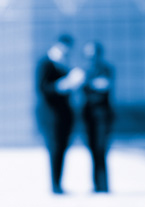San Francisco Superior Court Law & Motion Tips
September 8, 2011 by David Newdorf
Filed under Lit Tip Of The Week:™ Practical Advice For Litigators
Judges Peter Busch and Loretta Giorgi, who preside over the Law and Motion Departments at San Francisco Superior Court, provided useful tips and insights into the working of their courtrooms at a recent seminar. The take-away message: make it easy for the judge to rule in your favor. Be concise; avoid repetition; organize your brief with logical headings; organize the evidence with tabs; provide courtesy copies to chambers; if attacking the pleadings, attach those to your motion.
This is always sound advice, and even more so with the conslidation of courtrooms and judicial staff layoffs.
Here are some noteworthy tidbits from the Bar Association of San Francisco event:
- Demurrers to answers, although permitted, seldom advance a case. Both judges discouraged them.
- There is a backlog of unsorted mail in the clerk’s office. If you want or need the order on your motion filed, bring it to the hearing or bring it in ex parte.
- Don’t file pro forma objections to every sentence of every declaration. Save evidentiary objections for points that matter. According to Judge Busch, parties are not entitled to rulings on every objection. Interestingly, Judge Giorgi said she reviews the objections — not the research attorneys.
- The Court does not have West’s California Reporter — cite to the Official Reporter (Cal. and Cal. App.). Parellel cites are unnecessary.
“We will rule on more summary judgment motions in a month than you will write in a career.” Judge Peter Busch.
- Unless your motion turns on an aspect of the legal standard for a motion — e.g., the shifting burden on summary judgment — you don’t need to recite the standard. The judges can recite that in their sleep.
- The judges need your courtesy copies and will continue the hearing if any courtesy copy is missing. If you want to make sure the hearing goes forward, lodge both your briefs and the other sides briefs.
- Judge Giorgi will often give a pro per litigant a break and continue the hearing if the unrepresented party did not give proper notice to opposing counsel of their intent to appear and contest the tentative ruling. Judge Busch generally will enforce the rule and adopt the tentative if proper notice was not given.
- The judges used to have a bench memo from their clerks for every motion. With staff reductions and conslidation, the judges now handle approximately one-third of the motions from start to finish without a bench memo.
ABOUT NEWDORF LEGAL – A BUSINESS LITIGATION FIRM
Newdorf Legal is the go-to small firm for big problems. When business executives and public officials face complex legal challenges, they turn to David Newdorf for advice and representation. The firm’s lawyers have significant experience in the private and public sectors handling high-profile litigation. Newdorf Legal provides business and public entity clients expert advice and representation in:
- business litigation
- commercial disputes
- California breach of contract lawsuits
- business torts/interference with contract
- real property litigation
- joint venture/partnership issues
- investor lawsuits
- fraud and other civil actions
For a free copy of our informative brochure, “The Top 10 Business Litigation Mistakes . . . and how to avoid them,” contact Newdorf Legal.
Call David Newdorf at (415) 357-1234 for all of your California complex litigation questions.










